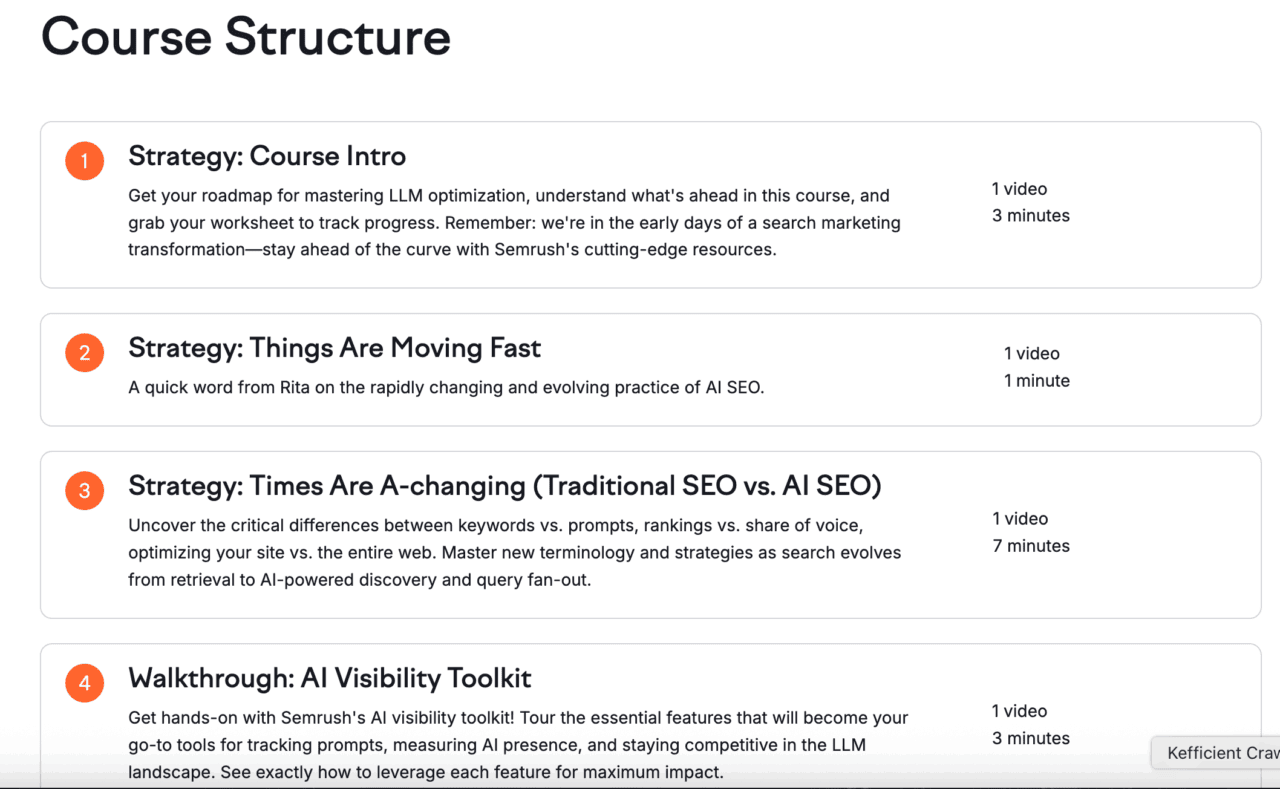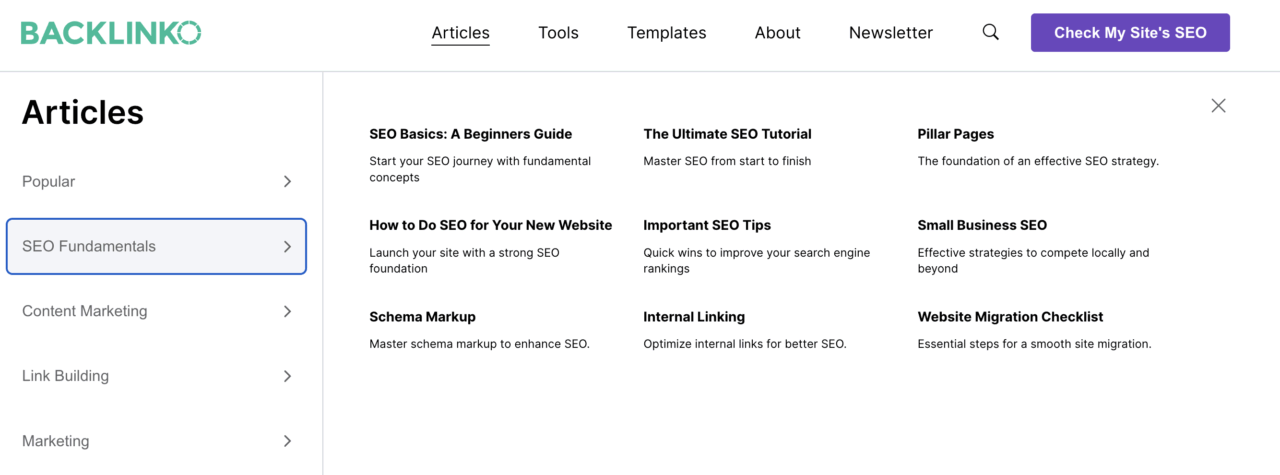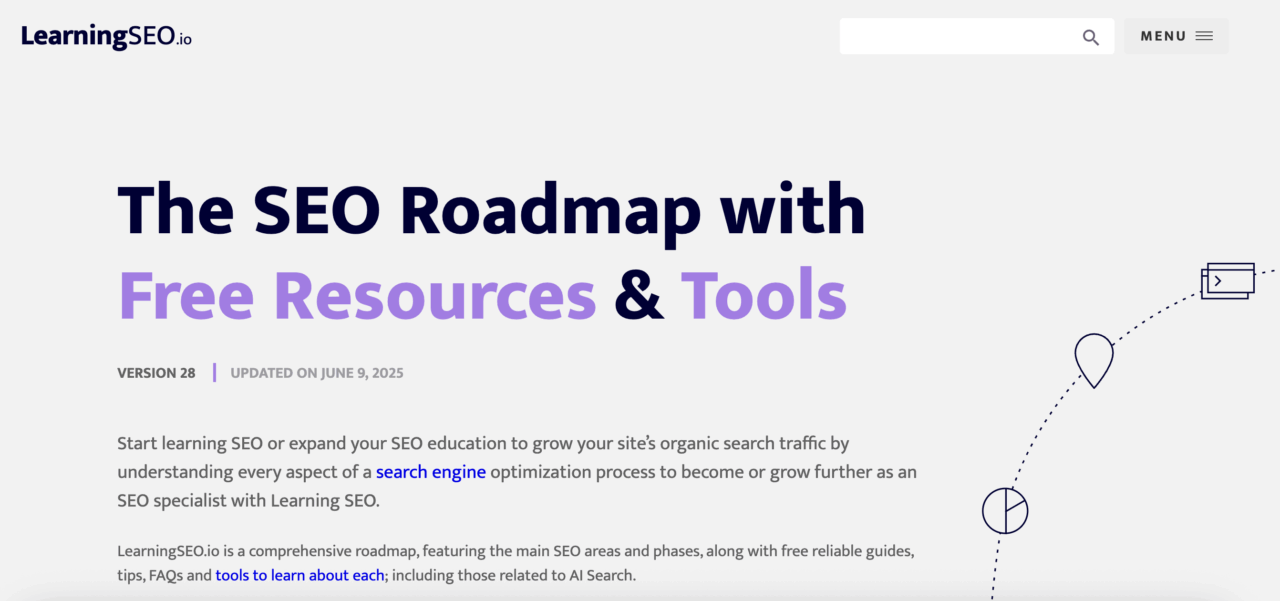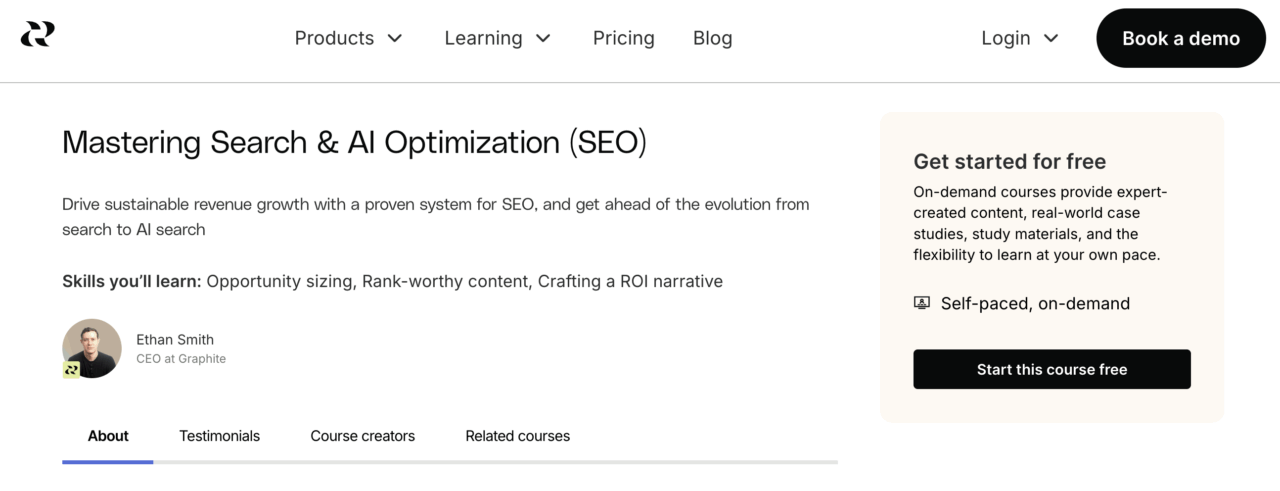9 Courses That Actually Teach SEO and AI Search (Free + Paid)

Written by Ankit Vora

SEO is evolving fast.
The fundamentals still matter — keyword research, site structure, content, links. But search is no longer just about rankings. AI systems like ChatGPT, Perplexity, and Google’s AI Mode are now answering your audience’s questions before they ever visit a site.
That’s why the best learning paths teach both SEO and AI search strategy — how to rank and how to get cited in AI-generated answers.
This list highlights a mix of both. Some courses cover timeless SEO skills. Others focus on AI-driven discovery and visibility. All are worth your time, depending on where you’re at.
Our top pick for 2026? Semrush Academy, which offers up-to-date, expert-led SEO training at no cost.
You get both foundational skills and advanced strategies — plus a certificate for every course you complete.

Even more exciting is they recently published their AI Visibility Essentials Course, which the Backlinko team helped bring to life!
In our searching for great SEO courses, we found 8 other programs — some free, some paid — that deliver, too. Each one teaches practical skills you can apply immediately, so it all comes down to what course is the best fit for your particular needs.
But first, let’s clear up a common question:
Does SEO certification actually matter?
Kind of. But not for the reason you think.
An SEO certification is official recognition of your search engine optimization knowledge, earned by completing a course and passing an assessment. It’s basically proof you’ve completed a course and passed a test that says, “I understand how SEO works.”

And for some people, that is valuable — especially if you’re just starting out or applying for entry-level roles.
- A certificate won’t get you hired on its own
- A real campaign that drives 50% traffic and revenue growth speaks way louder than any badge
- Certifications are best for beginners building foundational skills — or pros who want to formalize what they already know
- They do show you’ve invested time in modern SEO, which can help in interviews or pitching clients
Bottom line: the certification itself isn’t the goal. The structure, guidance, and real-world skills you build along the way—that’s what actually matters.
Benefits & Limitations of SEO Course Certifications
| Benefits | Limitations |
|---|---|
| Gives you structured, guided learning | Doesn’t guarantee real-world results |
| Builds confidence and understanding of SEO fundamentals | Most exams test theory, not execution |
| Helps you stay current with Google and AI search updates | No universal “official” SEO credential exists |
| Shows initiative and credibility on your resume or LinkedIn | Some programs are outdated or tool-specific |
| Great for beginners and career changers | Doesn’t replace hands-on campaign experience |
Should You Pay for an SEO Certification?
Free or paid doesn’t matter — employers care about your SEO skills, not how much you spent on training.
Look for courses with hands-on projects and experienced instructors who have proven SEO results. Student reviews and community access are valuable bonuses.
Remember: A certification just shows you’ve invested time in learning SEO. Your ability to drive results is what matters.
Now, let’s explore the best SEO courses available in 2026.
The 9 Best SEO Courses & Certifications
We’ve narrowed down our top SEO courses and certification list to the following:
1. Semrush Academy
| Best for | Beginner, intermediate and advanced |
| Duration | Multiple courses available in the Semrush Academy |
| Instructor(s) | SEO & SEM experts |
| Cost | Free |
| Certification | Yes |
Semrush Academy is a great place to start.

It’s home to some of the most value-packed digital marketing courses on the internet.
The Semrush Academy team closely collaborates with industry leaders (both external and in-house) to produce informative, engaging, and insightful courses.
Semrush Academy offers a wide range of courses, catering to digital marketers at every level of expertise, from beginners to advanced training, ensuring they grasp core concepts and gain a deeper understanding of cutting-edge industry practices.

For example, Semrush recently published their AI Visibility Essentials course, which shows you how to track prompts, see where your brand appears in AI answers, and create citation-worthy content. It also provides a hands-on tour of the AI Visibility Toolkit.

It’s about an hour-long and jam-packed with tips, so you get practical, LLM marketing playbook you can use immediately.
As of 2026, the Semrush Academy has more than 15 value-packed SEO courses.
Check these out:
- Semrush SEO Crash Course with Brian Dean (1 hr)
- GA4 for SEO – How data helps businesses grow with Jeff Sauer (1 hr)
- Crafting a Winning SEO Strategy: A Guide for In-House Marketers with Kevin Indig (1 hr)
- How to Outrank Your Competition in Local Search with Wes McDowell (1 hr)
- Content-Led SEO with Brian Dean (7 hrs)
- SEO Principles: An Essential Guide for Beginners with Kyle Byers (1 hr)
- Local SEO Course with Greg Gifford (1 hr)
- Technical SEO course with Bastian Grimm (3 hrs)
Upon completing these courses, you can participate in their respective assessments. If you pass, you’ll receive a personalized and downloadable certificate.
Like this:

Here’s a review of Semrush Academy on LinkedIn:
“I’d highly recommend the Semrush Academy courses to anyone of any level in #marketing or who has a general interest in the area. I’ve found them to be very accessible, with short, to the point, yet informative videos with transcripts/subtitles.” – Louise Frost DipGAI
2. Google SEO Fundamentals (UC Davis) by the University of California, Davis
| Best for | Beginners |
| Duration | 11 hours self-paced learning |
| Instructor(s) | Rebekah May |
| Cost | Free |
| Certification | Yes |
Google SEO Fundamentals is a great course for SEO beginners.

This course has been created by the University of California, Davis, and is available on Coursera.
The training comprises 28 videos divided into the following four modules:
- Getting started and introduction to on-page SEO
- Introduction to off-page SEO
- Introduction to technical SEO
- Keyword research and theory
The course takes 11 hours to complete. Meaning it requires a reasonable time investment.
However, it’s worth it. And if you’re a beginner looking to master SEO basics, you should definitely give it a try.
This course has four assessments. After passing them, you’ll receive a personalized and downloadable career certificate.
Like this:

Here’s a review on Coursera:
“Excellent course. Really breaks down all aspects of on-page, technical, and off-page SEO in an understandable, easily-digestible, and applicable way. The instructor was great and easy to follow. The additional readings, recommended resources, and suggested tools were extremely helpful if you want to dig deeper into more advanced aspects of SEO.” – Jordan Y.
3. SEO Certification Course by HubSpot
| Best for | Beginners |
| Duration | 4 hours self-paced learning |
| Instructor(s) | Rachel Sheldon and Matthew Howells-Barby |
| Cost | Free |
| Certification | Yes |
HubSpot’s SEO Certification Course is ideal for you if you want to learn and understand the fundamentals.

This course comprises 26 videos divided into six modules and takes about four hours to complete.
You’ll learn:
- SEO basics
- Technical and on-page SEO
- Keyword research
- Link building
- Optimizing your website for rich results
- SEO reporting

The course also includes five quizzes to test your knowledge.
After completing the course, you’ll earn a personalized and downloadable certification like this:

A genuine customer review couldn’t be found for this course.
4. SEO Training Masterclass 2026 by Alex Genadinik
| Best for | Beginners |
| Duration | 18+ hours self-paced learning |
| Instructor(s) | Alex Genadinik |
| Cost | $109.99 |
| Certification | Yes |
Alex Genadinik’s SEO Training Masterclass is one of the most popular and comprehensive paid SEO courses on Udemy, with more than 10,000 ratings and 100,000 students.

It’s a massive 18+ hour course with over 280 video lectures divided into 44 sections.
These lectures cover everything from keyword research to how to use SEO tools to URL structure for SEO, backlink strategies, local SEO and more.
Despite its comprehensive scope, Alex has skillfully structured the course.
So that you can effortlessly navigate through it or watch it without feeling lost or overwhelmed.
After completing the training, you’ll also earn a certificate of completion that you can display on professional platforms.
Like this:

The course also has dedicated sections to help you become a freelance SEO specialist, get a full-time job, or build an SEO agency.
The SEO Training Masterclass 2026 by Alex Genadinik is way better than many other courses on this list. It dives deep into the nitty-gritty of SEO and provides a practical approach.
Here’s a review of the SEO Training Masterclass on Udemy.
“This is an excellent course. It’s in-depth and provides a lot of different avenues towards improving your SEO with unique strategies and easy-to-follow instructions.” – Cassandra I.
5. Moz SEO Essentials Certificate
| Best for | Beginners |
| Duration | 6 hours self-paced learning |
| Instructor(s) | Moz Team |
| Cost | $595 |
| Certification | Yes |
SEO Essentials Certificate course is a six-part course offered by Moz.

If you aren’t familiar with Moz, it’s a popular all-in-one SEO platform.
It’s ideal for beginners as it covers:
- Fundamental SEO concepts: to learn the basics of SEO
- Keyword research: theories and framework for researching keywords
- Page optimization: important page optimization strategies and how to implement them
- Link-building essentials: what backlinks are, why they’re important, and how to get high-quality backlinks
- Reporting on SEO: how to set up and clean your data in Google Analytics
Each course section has quizzes to test your knowledge along the way.
The final part of this course includes an assessment that you need to pass to earn your Moz SEO Essentials Certification.
Like this:

Moz SEO Essentials teaches you how to apply your newly learned skills using Moz’s paid SEO tool called Moz Pro. So if you’re looking to use any other tools, this course may not be the right fit for you.
Also, its $595 price tag may be just too much, especially if you have a tight budget. Many free courses on this list offer similar educational value. So that’s something to consider as well.
For this course, a genuine customer review was not available.
6. Advanced SEO Certification Training by Matt Bailey
| Best for | Beginners and intermediates |
| Duration | 30+ hours self-paced learning |
| Instructor(s) | Matt Bailey |
| Cost | $799 |
| Certification | Yes |
Matt Bailey’s Advanced SEO Certification Training is a high-value SEO course that dives deep into the fundamentals, search engine algorithms, different SEO strategies, and content marketing. It’s available on MarketMotive, a respected online marketing training and certification company.

This course offers 30+ hours of video content and 15+ hours of live instructor-led online classes.
You can get your certification by:
- Completing 85% of the course.
- Completing three projects and one simulation test with a minimum score of 60%.
Here is a course review from their site:
“Now that everyone knows what the SEO factors are, we are making clear decisions that boost our online presence collectively as a team.” – Lorna Li
7. Backlinko
| Best for | Beginner, intermediate and advanced |
| Duration | N/A |
| Instructor(s) | Industry-leaders |
| Cost | Free |
| Certification | No |
Backlinko isn’t technically structured as a course, but we’ve designed the content to essentially be a course replacement, providing the fundamental and up-to-date SEO knowledge you need to be an effective practitioner.

We’re striving to be on the cutting edge of AI Search, with new guides, playbooks, and helpful templates published every month.
With 9 guides about SEO fundamentals alone, as well as more than 400 resources on topics spanning from LLM seeding to content strategy development, we publish a wide breadth of content about every subtype of SEO you can imagine.
Perhaps even more useful is our templates library, where you can take what you’ve learned and get started executing ASAP. Here are some example templates we offer:
- Keyword Research Template
- On-Page SEO Template
- SEO Strategy Template
- SEO Marketing Plan Template
- SEO Proposal Template
- SEO Report Template: Show Results, Save Time, Get Buy-In
- SEO Audit Template
Here’s a review of Backlinko on G2:
“The blog articles, guides, and videos published on the site provide valuable insights and practical tips for improving website rankings and traffic.” – Prema Toppo
8. LearningSEO.io
| Best for | Beginner, intermediate and advanced |
| Duration | N/A |
| Instructor(s) | Industry-leaders |
| Cost | Free |
| Certification | No |
Similar to Backlinko, LearningSEO.io isn’t technically a course, but it easily could be, as it’s jam-packed with resources.

It bills itself as a comprehensive SEO roadmap, offering a structured pathway for learning SEO from the fundamentals and onward.
The site was created by Aleyda Solis, a respected international SEO consultant who has spoken at countless conferences and shared endless numbers of free resources with the greater industry. In creating LearningSEO.io, she essentially compiled resources from across the industry’s brightest minds to create an organized hub.
Take a look to see if there are any knowledge gaps you need to fill.
For this site, a genuine customer review was not available.
9. Mastering Search & AI Optimization
| Best for | Beginner and intermediate |
| Duration | Undisclosed |
| Instructor(s) | Ethan Smith |
| Cost | Reforge membership ($1,995) |
| Certification | No |

What you’ll learn (high level):
- How AI is changing discovery and what to prioritize next quarter vs. next year.
- Playbooks for creating citation-worthy content and earning placements where LLMs pull sources.
- A practical system for shipping SEO that drives revenue, not just rankings.
How to Select the Best SEO Course for You
When evaluating SEO courses, focus on what your goal is.
If you want to dominate your local rankings, Semrush Academy’s “How to Outrank Your Competition in Local Search” is a must-watch.
Alex Genadinik’s SEO Training Masterclass is a great choice if you want to learn SEO from scratch without feeling overwhelmed.
If you’re not sure where to start, try a fundamentals course and then layer on specific subsets of SEO training.
And whatever you choose, good luck, and happy learning!
Backlinko is owned by Semrush. We’re still obsessed with bringing you world-class SEO insights, backed by hands-on experience. Unless otherwise noted, this content was written by either an employee or paid contractor of Semrush Inc.